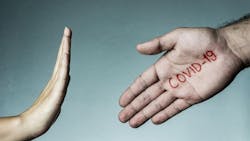In brief: Key protection from COVID found in spit; commonalities of "NOVIDs"
Protective saliva and COVID-19
Suspecting that an individual’s innate immune system may be a factor in keeping them from contracting COVID-19, a research group has shown that saliva from SARS-CoV-2 uninfected individuals interferes with the binding of the spike protein S1 to cells. The researchers “believe that our findings will contribute to the development of methods to not only prevent or treat COVID-19 infection, but also prevent unknown viruses from infecting humans in the future at the innate immune level."
Bridging gaps in care for vulnerable patients
When dealing with a cancer diagnosis, many patients have to deprioritize other health care. But people with cancer can experience unique issues related to their oral health, ranging from radiation treatment that can damage the salivary glands to other treatments that can leave patients susceptible to dangerous oral infections. The solution: giving dentists a primary role on the cancer care team. Learn how the NYU College of Dentistry is working to bridge the gap between cancer care and dental care.
A deep dive on why some foods are bad for teeth
DentistryIQ recently published an article on foods (and drinks) to follow with a toothbrush, including some that might surprise you. The New York Times offers a deep dive on why some foods are worse than others, what types of foods are bad for teeth, and science-backed strategies to thwart decay.
Common aspects of “NOVIDs”
Despite COVID’s pervasiveness—at least 60% of the US population has contracted it, by some accounts—there are many who’ve managed to avoid it. Innate immune protection aside, many of those who haven’t yet been infected—so-called “NOVIDs”—seem to share certain habits and lifestyles.
Diabetes and dental consequences
While patients with both Type 1 and Type 2 diabetes were known to have elevated rates of cavity formation and tooth loss, scientists didn’t know why. Recent Rutgers research may help explain: lower durability and strength of dentin. Testing on diabetic mice showed significant variations in dentin microhardness as compared with the nondiabetic mice.
About the Author
Elizabeth S. Leaver
Digital content manager
Elizabeth S. Leaver was the digital content manager for Endeavor Business Media's dental group from 2021-2024. She has a degree in journalism from Northeastern University in Boston and many years of experience working in niche industries specializing in creating content, editing, content marketing, and publishing digital and magazine content. She lives in the Boston area.
